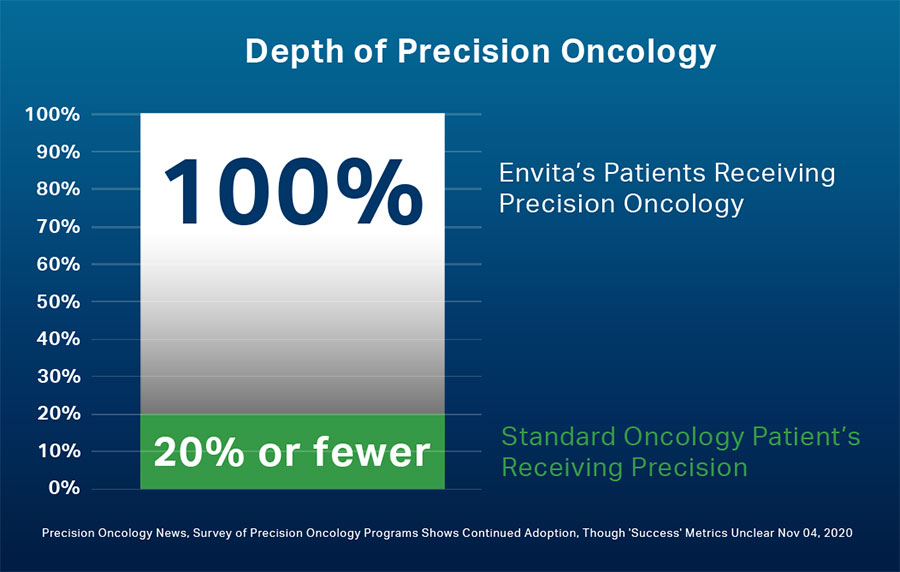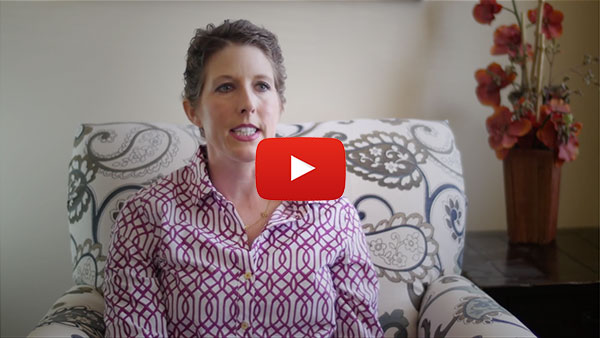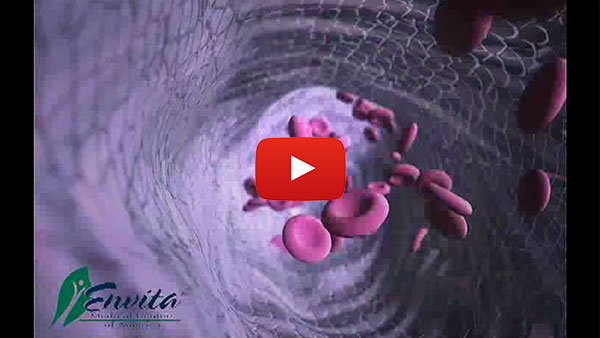Value-Based Precision Oncology with Transparent Pricing Optimizes Outcomes

Cancer patients deserve access to outcome-oriented precision cancer care, customized to their needs, without having to worry about high or hidden costs or having to navigate complexities. related to insurance-based oncology reimbursements. According to Duke University, many factors, such as drug prices, facility operation fees, and lack of infrastructure to deliver precision oncology, impact patient access and treatment costs related to precision molecular oncology.
In general, standard healthcare is slow to adopt new technology and this is especially true in precision oncology. Precision oncology is often defined by adding genomic targeting, but Envita Medical Centers goes beyond genomic targeting to include precision immunotherapy targeting and integrative adjuvant targets for its patients.
Envita's precision oncology model has been developed over two decades of helping patients, many of whom had failed cancer treatments in other well-known cancer facilities. To help patients respond to care, Envita's team of integrative physicians have developed this unique integrative precision infrastructure, optimizing benefits for patients with late and early-stage cancers.
Navigating oncology treatments, costs, and technology as a patient is difficult if not impossible without guidance from highly trained and experienced organizations that work in the precision oncology space. To make matters worse, often the cost of care in oncology is neither transparent nor correlated to the quality of care received. Better patient outcomes at a transparent price are the key metrics that matter most to patients and their families, and these metrics can be met by using Envita's value-based precision oncology model.
Standard Health Insurance Limits Value-Based Precision Oncology
Large BUCAs (Blue Cross, United, Cigna and Aetna) bring in billions in premiums, pay out only contracted services claim amounts, and invest the difference as a tax advantage. As mainly financial institutions, insurance companies function more like banks and investors, rather than healthcare agencies who are keen on improving patient outcomes and quality of care. With financial institutions driving healthcare, the challenges of bringing about a true value-based precision oncology model becomes more difficult because they are not focused on outcomes.
Many insurance providers have not priced in the total risk of rising precision oncology drugs and therapeutics, which is considered as one of the greatest contributors to increasing costs for employer groups and insured members' premiums. Making matters worse, insurance providers often deny or greatly minimize precision oncology coverage causing many Americans to deplete their savings to receive life-saving treatments.
Precision Oncology is an Essential Option
Due to disease heterogeneity, (same cancer type having unique targets), standard treatments, such as chemotherapy or radiation, are effective in only a subset of the patient population, making it clear that personalized medicine and precision cancer treatments can result in immense patient benefits. Unfortunately, through standard insurance-based care, only a few patients, if any, ever have access to precision oncology, but Envita is working towards changing this for providing the benefit of precision oncology to every patient.
An internal study found that 90% of patients were on the wrong drug targets before starting care with Envita Medical Centers, based on Envita's 2020 data. “Clinically we are helping many patients, as they deserve outcome-oriented care that reduces side effects, increases longevity, and improves their quality of life. Many of Envita's patients had failed care elsewhere, but start to respond with our precision care, and that speaks volumes about our innovations,” said Dr. Dino Prato, Founder and CEO, Envita Medical Centers and Envita Centers of Excellence (COE).
Envita's in-depth precision oncology utilizes advanced genomic analysis and highly customized immunotherapy options, as immunotherapy has emerged as an efficacious and less-toxic treatment alternative to untargeted chemotherapy.
It perfectly fits the rationale of precision medicine, as it aims to treat patients based on patient-specific, immune-targeted molecular traits, to achieve the maximum clinical benefit.
Costs of Specialty Drugs in Standard of Care
Prices of drugs in oncology, especially precision oncology, are expensive, which is why standard insurance either does not cover or partially covers these costs. The following immunotherapy drugs, some of which are used commonly, throw light on the total costs of precision cancer care:
- Immune checkpoint inhibitors for instance represent a fast growing adoption in immune oncology treatments and incur significantly higher total costs per patient than the non-immune checkpoint inhibitors treated group in the 6 months post-treatment initiation ($141,537 vs $75,429) based on an IBM Watson study.
- CAR-T therapies - $475,000 cellular immunotherapy
- Axicabtagene ciloleucel - $373,000
Source: https://jamanetwork.com/channels/health-forum/fullarticle/2759663
When these treatments are administered in hospitals or cancer specialty facilities, the insurance total billable cost will exceed over $1,000,000.
Standard Hospital and Facility Fees
Insurance costs can easily exceed over $1,000,000 in total billable services in late-stage cancer treatments. In an insurance census report for 2023 for stage 2 breast cancer, a patient that failed initial standard of care treatment at a “prestigious cancer institute”, quoted the employer group at $550,000 in care for 2023 alone. $380,000 was allocated to standard chemotherapy alone and the remaining allocation in hospitalization and other potential complications (taken from internal census Envita Health Data).
These costs do not include the use of any precision oncology, which is why patient outcomes are not always optimistic, making them perceive their healthcare system as broken with skyrocketing prices. In such situations, they are often compelled to seek better care on their own. According to several seasoned insurance brokers, the cost to treat late-stage cancer patients, who have failed standard of care, represents some of the greatest expenses in health care plans, potentially leading to an estimated 30-40% increases in annual premiums for employer groups.
Typical oncology fees in facilities and hospitals range from 300% - 1000% of Medicare to deliver standard non precision oncology treatments. As a result, patients can end up paying more out-of-pocket for standard care treatments, without experiencing the benefits of personalized precision medicine, which Envita has implemented and perfected over several decades of work.
Innovative Approach to Overcome Standard Limitations
Envita's targeted therapy approach overcomes all these limitations by utilizing their unparalleled precision oncology model, which has a strong focus on patient outcome and experience. Insurance companies reimburse standard oncology care from CPT codes based on services rendered by contract providers, such as hospitals and facilities, at a contracted rate of 300%-500% of Medicare, on average (often the bigger the name of the cancer center, the higher the contract rate). In contrast, a recent 3rd party actuarial response data from 2020 certifies Envita's fees at 141% of Medicare rates,* making Envita's fees less than half the cost of conventional care for much more technologically advanced precision care.
With standard insurance-based care, less than 20% of cancer patients have access to precision oncology, and even when they do, they receive a watered-down version compared to Envita's in-depth precision oncology program.

With better understanding of the biological underpinnings of cancer, precision medicine has evolved beyond a mere concept to an actual, real-world pursuit, and Envita's MTB (molecular tumor board) aims to utilize its maximum potential for enhancing the health outcomes of their patient population using the best treatments in the world. Envita's in-depth precision analysis includes proprietary bioinformatic of several key parameters, like, immunological, next generation sequencing (genomic), and adjuvant targeting (enhancements), which are concurrent with several factors to include liquid and tissue biopsy.
Most of Envita's detailed proprietary test algorithms and treatments are denied by standard health insurance companies, which are basically financial institutions, driven by profit and not motivated by patient outcomes. However, Envita's innovative precision interventions have helped many patients, who had failed standard, outdated care models.
Envita Precision Algorithm vs.
Standard Oncology Precision Testing
-
Envita Medical Centers
-
Standard Oncology
Precision Testing - RNA Transcriptome Genes
- Envita Medical Centers: 20,000+
-
Standard Oncology:
Unchecked
- SNV/CNV Genes
- Envita Medical Centers: 452
- Standard Oncology: 309
- Rearrangements/Fusion Genes
- Envita Medical Centers: 51
- Standard Oncology: 27
- Microsatellite Instability (MSI)
-
Envita Medical Centers:
Checked
-
Standard Oncology:
Checked
- Tumor Mutation Burden (TMB)
-
Envita Medical Centers:
Checked
-
Standard Oncology:
Checked
- BRCA 1/2
-
Envita Medical Centers:
Checked
-
Standard Oncology:
Checked
- Immunohistochemistry
-
Envita Medical Centers:
Checked
-
Standard Oncology:
Unchecked
- Chemosensitivity
-
Envita Medical Centers:
Checked
-
Standard Oncology:
Unchecked
- Concurrent Liquid Biopsy
-
Envita Medical Centers:
Checked
-
Standard Oncology:
Unchecked
- Exosomal miRNA Analysis
-
Envita Medical Centers:
Checked
-
Standard Oncology:
Unchecked
- Circulating Tumor Cells Enumeration
-
Envita Medical Centers:
Checked
-
Standard Oncology:
Unchecked
- Pharmacogenomics
-
Envita Medical Centers:
Checked
-
Standard Oncology:
Unchecked
- Individualized Therapy Recommendation
-
Envita Medical Centers:
Checked
-
Standard Oncology:
Unchecked
- Carcinogenic Exposure - Root Causes
-
Envita Medical Centers:
Checked
-
Standard Oncology:
Unchecked
- Inflammation Markers
-
Envita Medical Centers:
Checked
-
Standard Oncology:
Unchecked
- Metabolic Target Drivers
-
Envita Medical Centers:
Checked
-
Standard Oncology:
Unchecked
*Individual results may vary. Envita makes no guarantees for outcomes.
Envita's detailed molecular testing and their advanced precision oncology algorithms have guided the clinical decisions of their molecular tumor board, leading to successful responses of their patients, many of whom had failed to experience results with standard oncology. The standard of care, followed in all National Cancer Institute (NCI)- designated cancer centers, is based on the National Comprehensive Cancer Network (NCCN) guidelines, which allow access to minimal precision oncology, only if patients do not respond to the first-line treatments. However, this delay in access to precision oncology may lead to unnecessary deaths, increasing mortality rates in cancer. In fact, following the NCCN model often leads to higher costs than Envita's in-depth customized treatment model, which utilizes innovative precision technology to optimize treatment responses.
Outcome Driven Care
Envita's personalized precision oncology approach is designed on an n-of-1 clinical trial model, which is a single subject clinical trial, considering an individual patient as the sole unit of observation. The goal of the n-of-1 model is to determine the optimal or best intervention for an individual patient using objective data-driven criteria. This model is in contrast with large sample clinical trials, which should be approached with caution, as they are designed to determine the efficacy of a new drug or therapy. Envita's unique approach focuses on improving the quality of life and increasing longevity of each individual cancer patient, while attempting to reduce toxicities and minimize treatment related side-effects. Scientific research show that immunotherapy treatments have the potential to treat cancer with significantly less toxicity than chemotherapy and radiation treatments, which is why Envita's personalized medical blueprint for each individual patient includes customized immunotherapies for early stage as well as advanced cancers.
Advanced Immunotherapies for all Stages and Types of Cancer
The immune system is your first and last line of defense against cancer and bolstering it helps to optimize patients' responses while dealing with this life-threatening disease of genetic mutations. Due to these varying genetics, the molecular profiles and biomarkers reveal different treatment targets for each individual patient, which explains why every patient does not respond similarly to the same protocol. Medical studies indicate how an integrated biomarker design should also be able to guide novel immunotherapy combination strategies to overcome therapeutic resistance, which is what Envita's team attempts to achieve for all their patients. Their proprietary liquid biopsy harvests biomarker information, going beyond the standards, such as, EGFR (Epidermal Growth Factor Receptor), HER2 (human epidermal growth factor receptor 2), and anaplastic lymphoma kinase (ALK).
Envita's customized immunotherapies can be deployed either through minimally invasive, proprietary interventional radiology procedures, intravenously, or orally. Their unique protocols also include a combination of the latest FDA (Food and Drug Administration) approved drugs, repurposed drugs, and custom-compounded adjuvants to attack the cancerous cells from all possible angles and support the patient's vitality. Encouraged by their patients' responses, Envita's team has developed a novel STIGPOR (Short Term Immunotherapy-focused Genetic and Physiological Oncology Response) scale, to define objective responses to treatment, more accurately in 4 weeks, instead of the standard 12 weeks.
“There are new ways in precision oncology to target cancer, and the STIGPOR scale helps in countering the outdated and reactive ways of measuring response to cancer treatments, which delay appropriate interventions. This model includes several new parameters, including the conventionally used Chio Criteria and the iRECIST guidelines, to eliminate long wait times for measuring response to treatments,” said Brian Harrison, President and COO, Envita Medical Centers and Envita Center of Excellence, who is actively publishing a peer-reviewed paper on the STIGPOR scale. An accurate measure of each patient's response to treatment at a regular interval of every 4 weeks enables Envita's team to include timely proactive interventions, aimed at ensuring a better chance of a holistic recovery from the disease.
Transparent Provider in Precision Oncology
Scientific reviews indicate that economic sustainability and cost-effectiveness of PCM (Precision Cancer Medicine) can be ensured and its use in daily clinical practice can be broadened in the near future, but Envita has brought the future to our patients that need it, today. A 3rd party actuarial reviewed response data shows 88% of their patients experienced symptom score improvement with 95% fewer side-effects.*
Envita's transparent pricing and their optimistic outcome metrics has motivated several self-funded employer groups to collaborate with them as an option for treatment. “Envita was the only provider in the cancer space that was transparent on cost and willing to collaborate on a solution,” said Dave Madden, Employee Benefits Adviser, CBIZ, who coordinated collaborations between Envita COE and several self-funded employer groups.
Value-Based Precision Oncology
To offer precision treatments at a cost-efficient rate, Envita's team works on a value-based model, which is in stark contrast with the conventional fee-split model, where clinicians' payments are linked directly to the number of procedures and appointments. At Envita, doctors are salaried, and patients' treatments have no bearing on their salary or income, instead the salaried doctors receive certain incentives based on the outcome metrics of their patients.
Powerful Combination Approach
Envita utilizes a powerful integrative approach, which combines the latest developments in conventional oncology with research-based natural medicines, but several critics question the validity of the use of integrative medicine. They fail to see the efficacy of this powerful combination approach and support the outdated and more expensive, big-pharma driven, insurance-based care, which solely follows the NCCN guidelines. However, science and data have been proving the critics wrong as there is an increased acceptance of TCAIM (Traditional, Complementary, Alternative and Integrative Medicine) among conventional healthcare providers and a high prevalence of its use among patients. Growing research in this field is supported by the fact that a total of 172,466 publications (42,331 open access), have been published by 219,680 authors in 143 journals from 1938 to 2021. Since the 1940s, there is an upward trend with respect to the volume of publications, with a steep increase observed between the mid-2000s and mid-2010s.
Envita is a proud leader in integrative medicine providing an evidence-based precision oncology approach, which gives patients an advantage over standard oncology care. This unique and holistic value-based precision care model meets the needs of cancer patients, who rightfully seek alternative options for themselves.
* The 3rd party actuarial response data is based on an analysis of 87 out of 129 patients that participated in Envita's Treatment Program in 2020. 42 patients were removed from the cohort due to the patients' inability to start or complete Envita's prescribed treatment for a variety of reasons, including advanced disease state, disease progression or inability to travel.
Take a Tour and Learn More About Envita Medical Centers and Envita COE
To help you recover holistically and to make their advanced precision oncology treatments financially accessible for every cancer patient, Envita is working to launch a national healthcare plan. Through this plan you can experience a superior level of patient care delivered by Envita's expert medical team. Envita's team includes certified oncologists, interventional radiologists, researchers, and pharmacists, who undergo intensive training of over 1,500 hours to adapt to Envita's personalized precision oncology approach. Envita has more than 25 years of clinical experience in helping patients with complicated and advanced cancers. If you or your loved ones have any questions regarding cancer and the financial aspect of treatment, please feel free to call us at 866-830-4576.





















